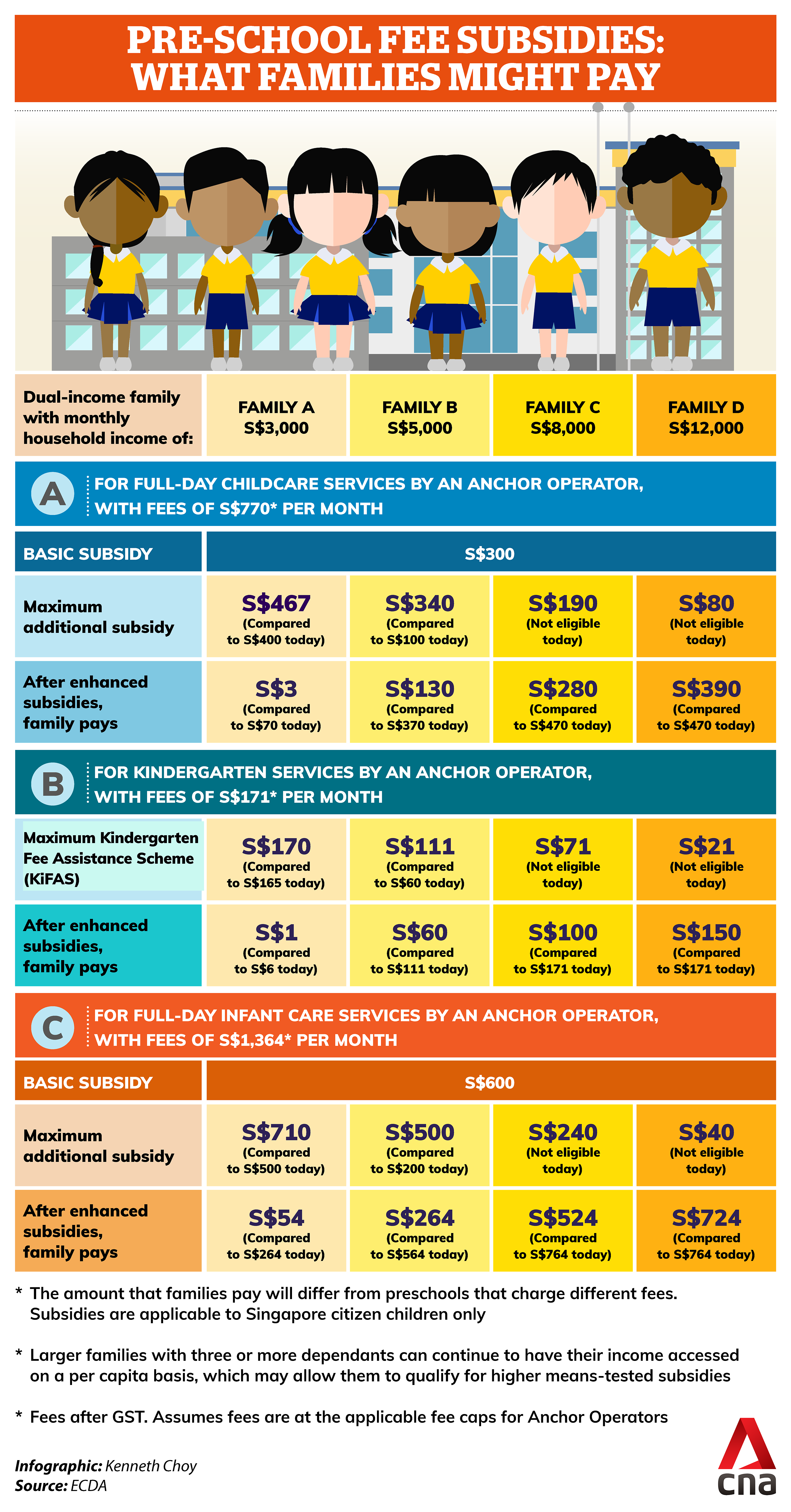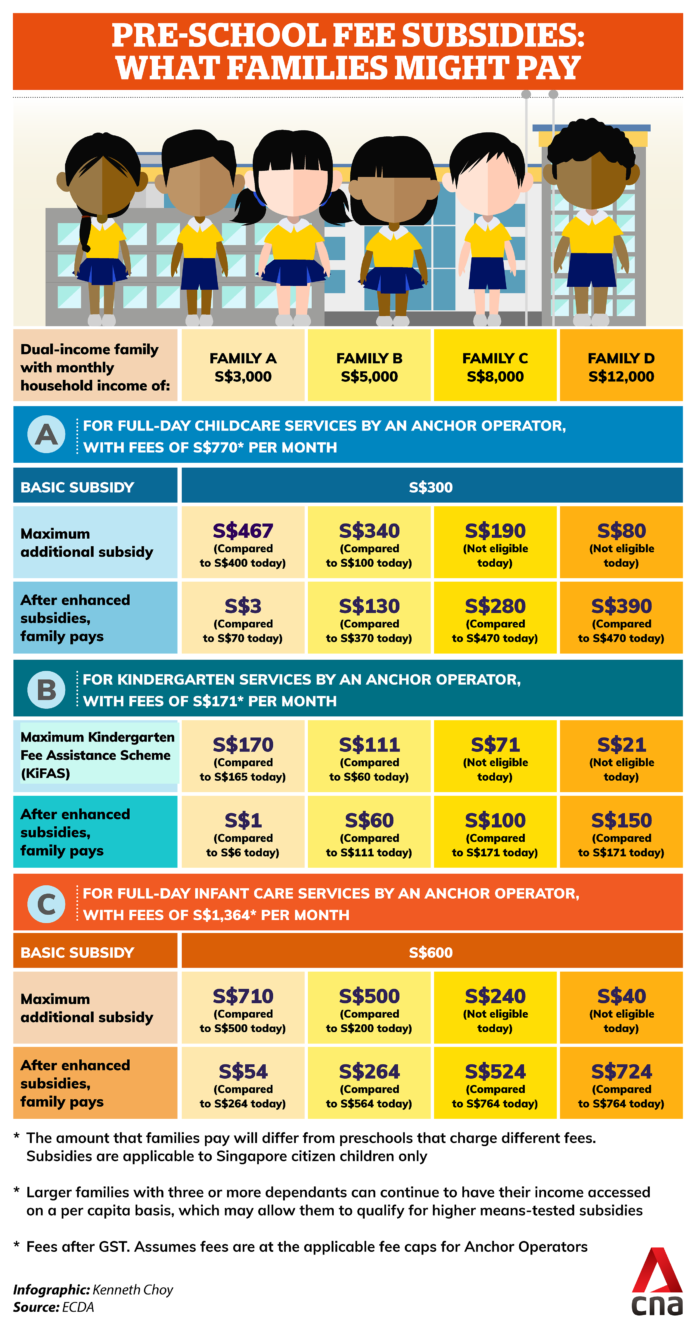SINGAPORE: Commenting on how 330 childcare centres in Singapore will raise the fees for their full-day programmes next year, Manpower Minister Josephine Teo said on Friday (Sep 20) that there is “some fairness” in them doing so.
This is because the fees among childcare centres, even those under the same operator, can be “quite different” despite having similar resources.
“Sometimes for historical reasons, the fees are quite different … when in fact the teachers are just as qualified (and) the centres just as well-resourced,” Mrs Teo said in an interview on CNA938’s Asia First.
“So there is some room, some fairness in them harmonising the fees,” she added.
About one-fifth of childcare centres in Singapore will charge higher fees next year, with the median increase being “within 5 per cent of fees”, the Early Childhood Development Agency told CNA this week.
READ: 330 childcare centres to raise full-day fees in 2020: ECDA
This comes shortly after the Government’s announcement of additional pre-school subsidies last month.
The subsidies, announced on Aug 28, aim to provide more support for low- to middle-income parents. For example, families with a gross monthly income of S$3,000 will pay S$3 a month, down from S$70, per child at anchor operator pre-schools.

Asked by CNA938’s Arnold Gay if she is keeping a close eye on the fee revisions because they could potentially affect or negate the subsidies, Mrs Teo replied that a large majority of these childcare centres planning fee hikes are government-supported, and their fees remain below the stipulated limits.
The Government provides funding to anchor and partner operators, which in turn are required to keep their fees affordable by adhering to monthly fee caps.
Full-day childcare fees, excluding Goods and Services Tax, are capped at S$720 a month for anchor operators and S$800 a month for partner operators.
These fee caps have remained the same over the past three to five years, noted Mrs Teo.
In addition, government-supported childcare centres can only make “small” fee adjustments of no more than 5 per cent each time.
READ: Additional subsidies for pre-schools to increase from January 2020
Said Mrs Teo: “Because there is a fee cap, the Government also has another rule: If you want to harmonise, you can but you can only take small steps.
“What’s happening for the 330 centres is that most of them are within the fee-capped, government-supported sector, their fees are still below the cap.”
With that, the recently announced additional subsidies still mean “significant reduction” in childcare costs for some households.
Raising the example of a family earning S$5,000 a month, Mrs Teo explained: “Previously without the fee increase, even after subsidies, they will be paying S$350. Now let’s say the pre-school raises fees by S$20, within the 5 per cent cap, with the new subsidies (that are) coming into effect, they still pay much less (at) S$130.
“So from S$350 to S$130, it’s still a significant reduction,” she said.
READ: Is bigger really better? The role of mega centres in Singapore’s pre-school landscape
CITIZENS’ PANEL TO CREATE SOLUTIONS TOGETHER
The radio interview also touched on the Government’s call for Singaporeans to join a citizens’ panel to discuss and make recommendations on work-life harmony issues.
First announced by Deputy Prime Minister and Minister for Finance Heng Swee Keat in June, the panel is part of a series of Government engagements with Singaporeans on marriage and parenthood issues led by Mrs Teo.
Mrs Teo, who also oversees the National Population and Talent Division, said the goal is to have several discussions between a “diverse group” of slightly over 50 people. Responses from the public have been “very good” thus far.
“People wrote in quite enthusiastically so we had to be quite mindful. If the panel is too big then it is a bit harder to get into deeper conversations,” said the minister.
“I think (slightly more than 50 people is) a good size to work with – sufficiently representative but also provides opportunities for them to gel and really work together.”
Those in the panel will have to commit to meetings over four weekends so as to ensure sufficient time for meaningful discussions, added Mrs Teo. “It’s not a one-time, two-hour dialogue session.”
READ: Citizens’ panel to discuss work-life harmony now open for applications
Even though official policies can help, the Government recognises that social norms still have a huge influence over how people think about marriage and parenthood. In particular, culture at the workplace “matters a great deal”, said the minister.
“Whether (workers) feel supported when they need to take time out to attend to family commitments, particularly if it concerns children. Whether bosses give the signal ‘it’s okay’ (and) whether co-workers also feel ‘yes, we understand from time to time, we have to carry the load for each other’.
“That sort of environment is equally important and that is why we decided in addition to the policy enhancements … it is also important to promote a certain improvement in workplace culture.”
This progress towards achieving a balance between work and family commitments is “an important conversation for everyone to take part in”, said Mrs Teo.
“That isn’t something that the Government can dictate.”
Asked if the panel’s recommendations could be turned into laws or policies, the minister replied: “We want to be open to that possibility.
“In this next phase of Singapore’s development, the idea of partnership is what we want to also encourage, meaning that we want people to come together and create solutions together.”
READ: 4G leaders will work with Singaporeans to design, implement public policies: DPM Heng
IVF POLICY CHANGES
Mrs Teo was also asked about recent policy changes that involve the removal of age limits for women undergoing in-vitro fertilisation (IVF) treatments (IVF).
As part of a range of measures announced last month to support marriage and parenthood, the age cap of 45 years old for women undergoing assisted reproduction technology (ART) procedures, which include IVF treatments, will be removed from Jan 1, 2020.
A cap on the number of IVF cycles a woman can undergo – currently set at 10 cycles for women aged 40 and below, and five for women above 40 – will also be removed.
READ: Singapore to remove age limit for IVF treatments, introduce new subsidies
READ: Getting pregnant through IVF now safer for older women, doctors say
However, some medical experts have expressed concerns that the removal of these age limits can give the wrong impression that delaying parenthood is acceptable.
The minister said these are valid concerns because while the risks of these medical treatments have gone down, the success rates have “probably not shifted”.
But changes to the existing policies were made so as to give Singaporeans the opportunity to access these treatments without having to travel abroad.
“It has become possible for Singaporeans to go outside of Singapore to access such treatments. Given a choice, would we rather that they have the opportunity to also receive such treatments in Singapore?
“The answer is probably yes because they can be less stressed about the whole process. They don’t have to travel abroad to get such treatments. They can get the care and support from their families here,” said Mrs Teo.
“However, it still has to be said that if parenthood is part of your plan, it’s probably better to start early.”





